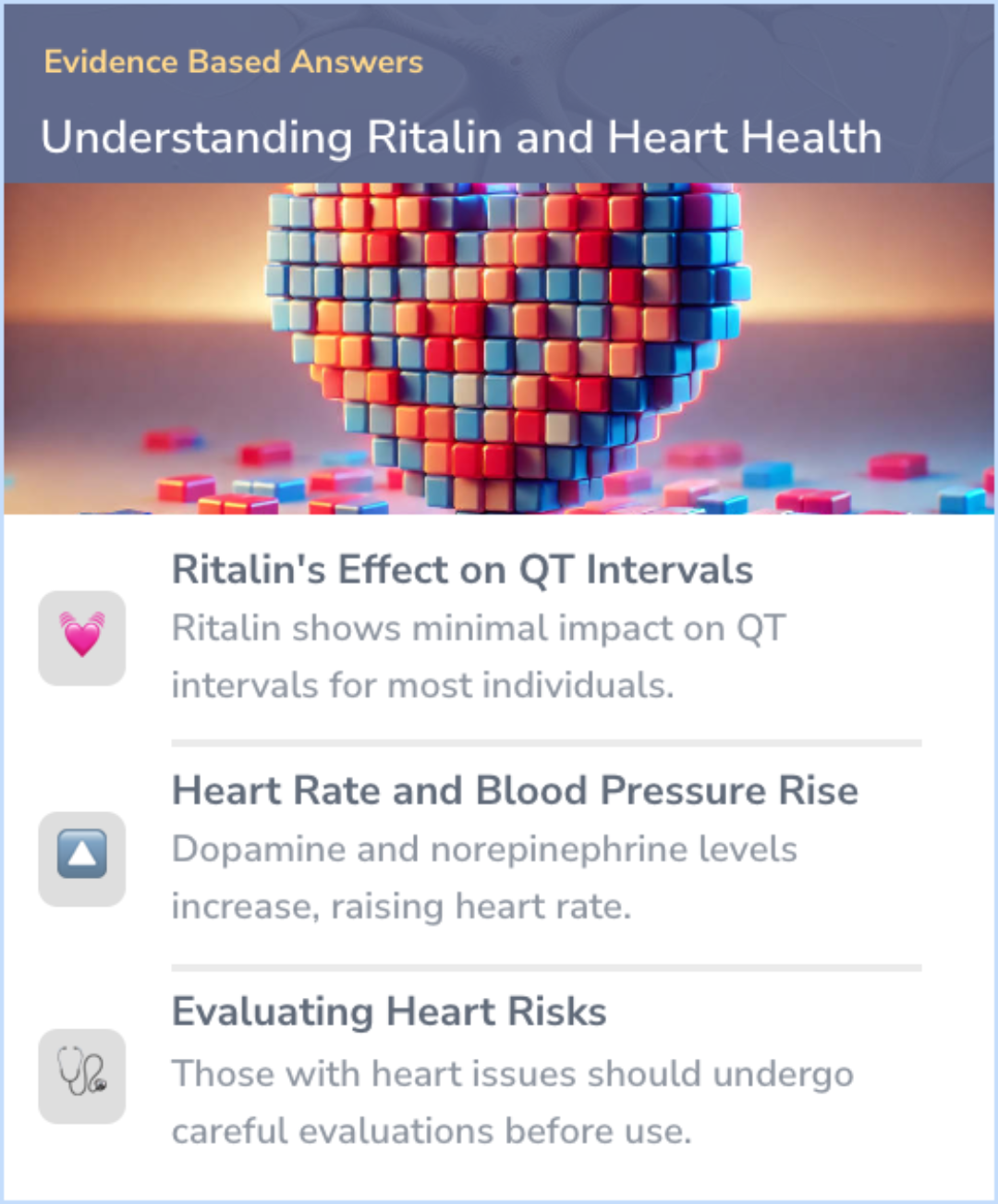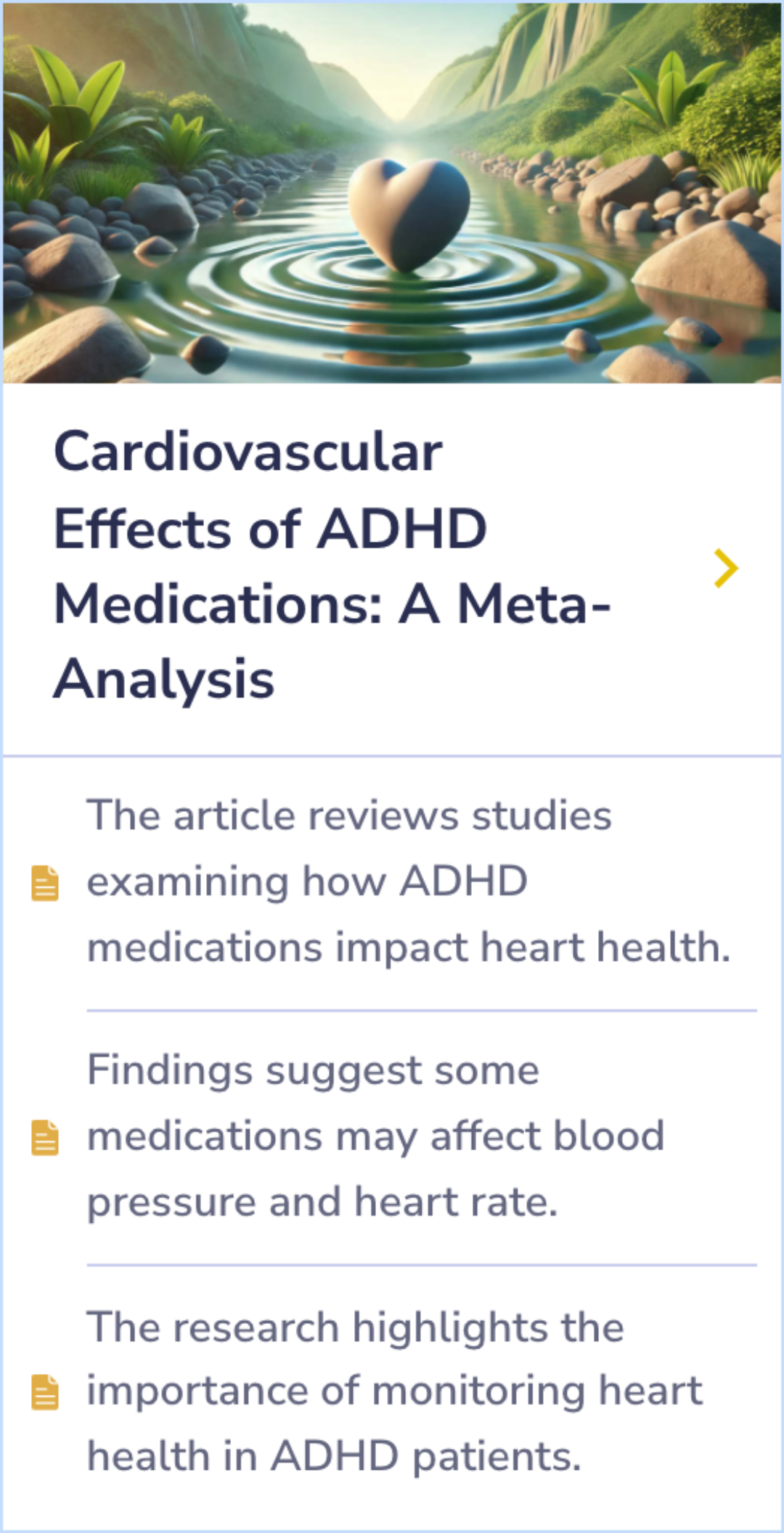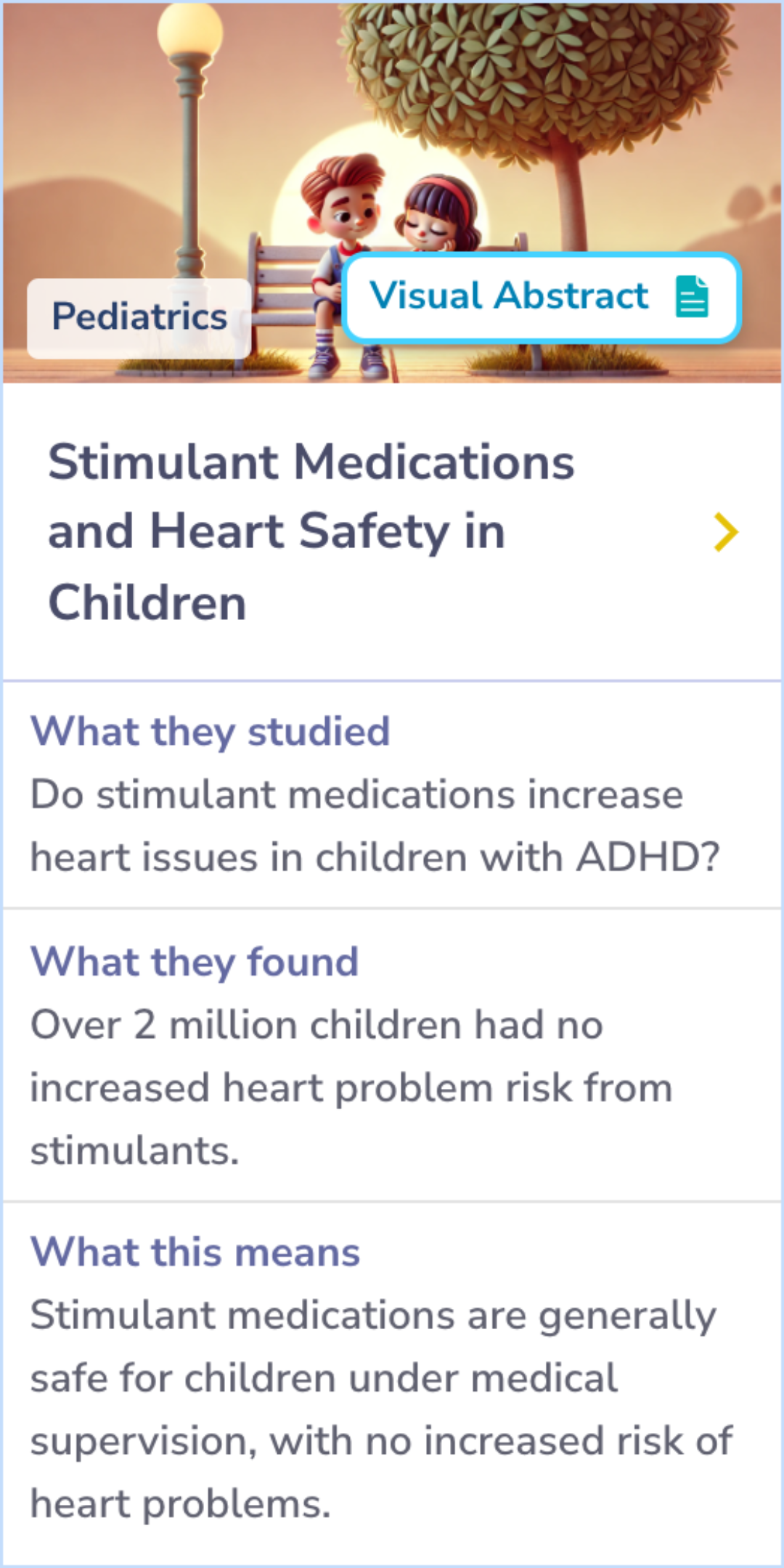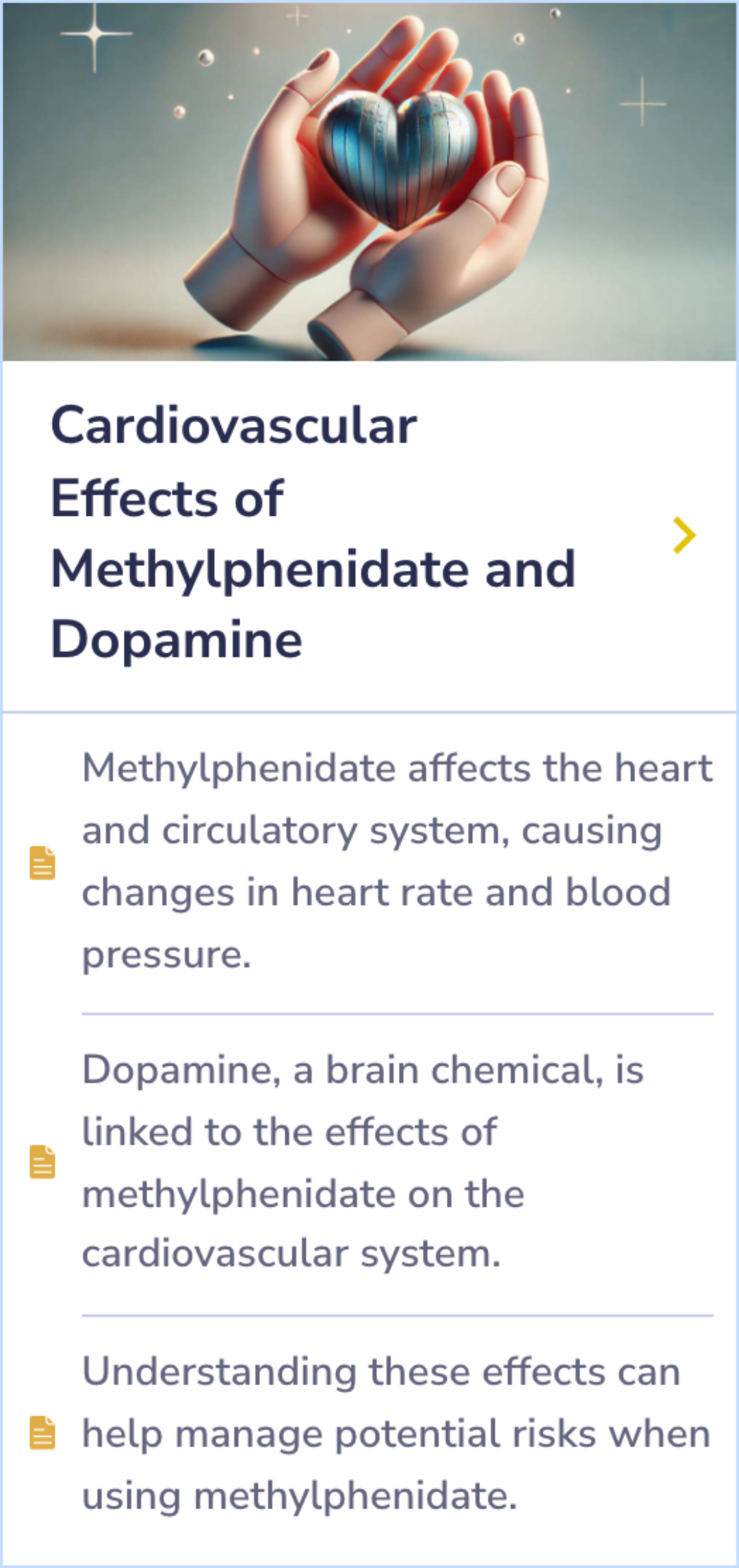Ritalin
Evidence Based Answers
Does Ritalin cause long QT?
Ritalin's minimal effects on QT intervals are noted, with increased heart rate due to dopamine. Caution is advised for those with existing heart conditions.
Published: November 7, 2024
Click to explore a section:

Ritalin minimally affects QT intervals but raises heart rate; those with heart issues require careful evaluation before use.
Background: Warnings
Ritalin, a stimulant, may increase the risk of sudden death in children with heart issues and can cause stroke or heart attack risks in adults. Additionally, stimulants can elevate blood pressure and heart rate.
Individuals using Ritalin should seek medical advice if experiencing chest pain or fainting, as these symptoms could suggest cardiovascular concerns that need prompt evaluation.
Individuals using Ritalin should seek medical advice if experiencing chest pain or fainting, as these symptoms could suggest cardiovascular concerns that need prompt evaluation.
Background: Ritalin's Minimal Effect on QT Intervals
Ritalin (methylphenidate) has a minimal effect on QT intervals for most people, with studies showing an average prolongation of less than 5 milliseconds, which is not considered clinically significant.
However, individuals with cardiovascular issues may be at increased risk and should be evaluated carefully for potential heart rhythm concerns.
However, individuals with cardiovascular issues may be at increased risk and should be evaluated carefully for potential heart rhythm concerns.
“
Source Quotes:
The maximum mean prolongation of QTcF intervals was <5 ms, and the upper limit of the 90% confidence interval was below 10 ms for all time matched comparisons versus placebo. This was below the threshold of clinical concern.
Prior to initiating treatment with a stimulant in adults, we review their cardiovascular history including history of chest pain, palpitations, syncope, myocardial infarction, arrhythmia, valvular disease and their family history.
Background: Ritalin's Impact on Heart Rate and Blood Pressure
Ritalin increases levels of dopamine and norepinephrine, which can lead to higher heart rate and blood pressure. For most people, the impact on QT intervals is small, but those with heart conditions should be cautious.
Monitoring for symptoms like palpitations or chest pain during Ritalin use can help identify any potential heart-related concerns.
Monitoring for symptoms like palpitations or chest pain during Ritalin use can help identify any potential heart-related concerns.
“
Source Quotes:
Methylphenidate has appreciable effects on norepinephrine reuptake and also binds (albeit weakly) to the serotonin transporter.
The neurotransmitter systems responsible for stimulant-associated adverse events and safety concerns are in large part related to stimulation of peripheral NE activity.
Background: Assessing Cardiac Risks Before Starting Ritalin
Individuals with structural heart issues or arrhythmias may have higher risks when using Ritalin. Rare cases of sudden death have been reported in people with these conditions.
Before starting Ritalin, a detailed cardiovascular history and appropriate testing, such as ECGs, are recommended for those with known heart problems.
Before starting Ritalin, a detailed cardiovascular history and appropriate testing, such as ECGs, are recommended for those with known heart problems.
“
Source Quotes:
It is important to note that there have been reported cases of sudden death in both children and adults with a pre-existing structural cardiac abnormality.
Children and Adolescents: Sudden death has been reported in association with CNS stimulant treatment at usual doses in children and adolescents with structural cardiac abnormalities or other serious heart problems.
Key Takeaways
Conclusions
Ritalin shows minimal effects on QT intervals, generally causing an average prolongation of less than 5 milliseconds, which is not significant for most individuals. However, those with pre-existing cardiovascular issues may face heightened risks, necessitating careful evaluation and monitoring.
Studies indicate that Ritalin can elevate heart rate and blood pressure due to increased dopamine and norepinephrine levels. While most users experience only minor effects, individuals with heart conditions should approach use cautiously, monitoring for symptoms like palpitations or chest pain during treatment.
Studies indicate that Ritalin can elevate heart rate and blood pressure due to increased dopamine and norepinephrine levels. While most users experience only minor effects, individuals with heart conditions should approach use cautiously, monitoring for symptoms like palpitations or chest pain during treatment.

Evidence Summary
How ADHD Medications Affect Heart Health
ADHD medications can impact heart health, with research showing changes in blood pressure and heart rate in some cases. These medications may elevate or lower these measures, depending on factors like dosage and individual response.
Research emphasizes the need for regular cardiovascular monitoring in ADHD patients, as these adjustments can help manage any potential risks tied to medication use.
Research emphasizes the need for regular cardiovascular monitoring in ADHD patients, as these adjustments can help manage any potential risks tied to medication use.
Evidence Summary
Comparing Cardiac Safety of ADHD Stimulants in Youth
This study tracked over two million children with ADHD to compare cardiac event risks between two common stimulant medications. Using data from Medicaid, researchers followed young users of methylphenidate and amphetamine salts to monitor emergency room visits for heart-related symptoms.
After accounting for health history, the findings showed that current users of either stimulant had no higher risk for cardiac issues than past users, indicating similar safety profiles for these medications.
After accounting for health history, the findings showed that current users of either stimulant had no higher risk for cardiac issues than past users, indicating similar safety profiles for these medications.
Evidence Summary
Methylphenidate's Impact on Heart Health
Methylphenidate can significantly influence heart function, specifically by affecting heart rate and blood pressure. As it interacts with dopamine—a neurotransmitter in the brain—these changes can be particularly notable in individuals with existing cardiovascular issues. Monitoring these vital signs becomes essential, especially for those with pre-existing conditions, ensuring that potential cardiovascular risks are kept in check.
This medication's impact on the circulatory system highlights the importance of awareness around its effects. The relationship between dopamine and cardiovascular responses further emphasizes the need for careful management during treatment.
This medication's impact on the circulatory system highlights the importance of awareness around its effects. The relationship between dopamine and cardiovascular responses further emphasizes the need for careful management during treatment.


